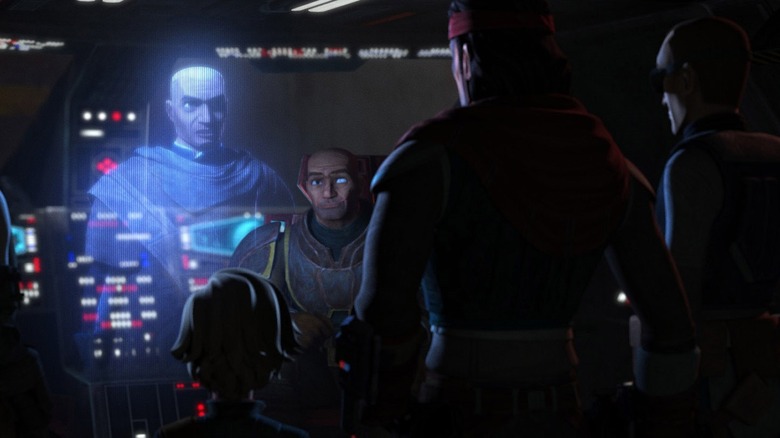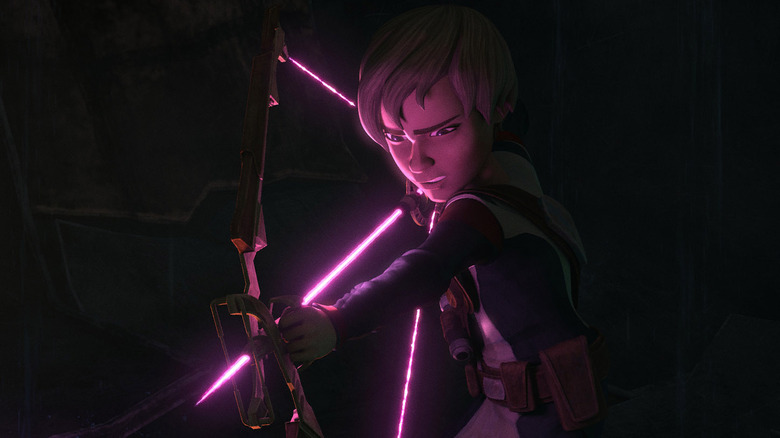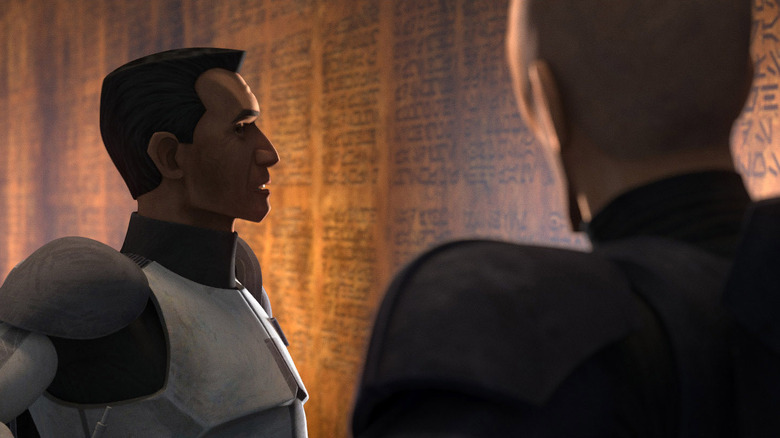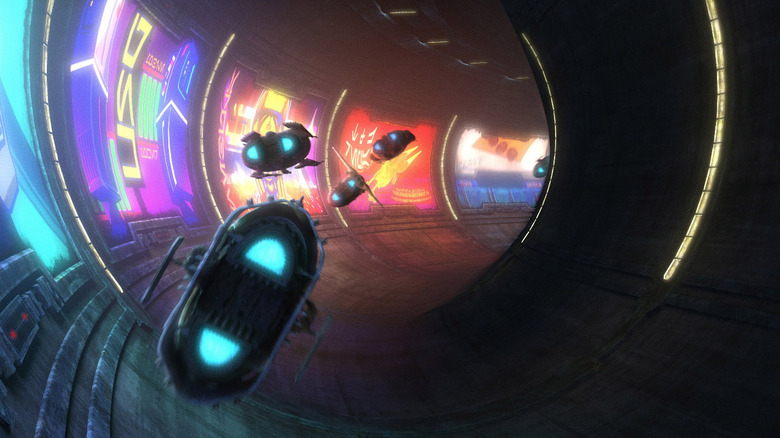The Bad Batch Showrunners Talk Live-Action Influences, Podracing, And More [Exclusive Interview]
"Star Wars" is often best in animation, where it can be allowed to be as weird and fantastical as the serials that inspired George Lucas in the first place, or as serious and operatic as any of the movies, all while giving us vastly different visual styles that can reflect the viewpoint of whoever is telling that story. Take Genndy Tartakovsky's "Clone Wars," which completely disregarded physics in order to depict the Jedi as the mythological, invincible warriors that citizens saw them as during the war, or how "Star Wars Visions" allowed different studios to reinterpret what "Star Wars" even is, giving us everything from samurai tales to a rock opera.
Or take "The Bad Batch," which follows in the style of "The Clone Wars" and its hyperrealistic cinematography with cartoonish character designs, giving viewers "Star Wars" tales on a smaller scale than any of the movies could while still feeling larger than life.
The first season focused on the immediate aftermath of Order 66, and the titular Batch slowly realizing that the Republic they were literally created to defend turned into the enemy they were fighting against. Going into season 2, the Batch has grown closer together than ever, while still mourning the loss of their home, Kamino. But increasing Empire hostilities around the galaxy leads to strife within the group about whether they should be doing more to help the galaxy.
/Film got to chat with showrunners Jennifer Corbett and Brad Rau about what to expect from season 2 of "The Bad Batch," being inspired by live-action, and channeling podracing.
Note: This interview has been lightly edited for clarity and brevity.
Looking at live-action for reference
There's a real struggle that we're seeing in the clones where they're starting to realize that maybe they're not the pure good guys that they once were in their own eyes. I'm curious how you handled that in this season, finding that tension there.
Corbett: I think with the Bad Batch, their reaction with the clones in the early season, it was more of, "They're the regs; we're the Bad Batch. We're different." And then when everything happened with the Empire, it was sort of the same but different for them. But then throughout season 2, once they learned the things in season 1 regarding their inhibitor chips and what the Empire has planned in phasing out the clones, the Batch, I think, become a little more personally involved in what that means for them and their identity.
The person leading that charge is very much Echo, because Echo sees the regs as more of his brothers. And we've had some friction between him and Hunter in season 1 about [the idea] that they should be doing more. And we do explore that in season 2 because that is very much who Echo is. He wants to help his brothers. So we're excited to talk about that.
I really enjoy the use of lighting in a lot of the scenes, especially in Coruscant, which almost looks like a live-action set. Can you talk about finding the look for the season?
Rau: Our team is so great and our director of lighting and photography effects, Joel Aron, is the best. He's so good. We talk a lot about how we can keep the style of "The Clone Wars" in season 1 of "Bad Batch," but how can we push things a little bit? So in Coruscant, there's a few subtle little things you might see where we've sprayed water down on the ground for a little bit of reflection when a car goes by, something like that.
In some of those episodes, we really look at a lot of noir lighting. We look at live-action references all the time, and that's our touchstone. It's fascinating. Behind the scenes, we have not only artists doing lighting concepts, but we also have so much reference that goes into every single episode. Sometimes in one shot, there's reference from five different films for that one shot. So we constantly talk about it and dig it up and try to keep our characters stylized. But the lighting has a sort of photo-real feel to it. When we get it right, it's really good.
'Hope is the name of the game'
The show is set during arguably the darkest time in the franchise. How do you find a balance of showing us some of that darkness while still maintaining some hope in the tone of the show?
Corbett: Hope is the name of the game for "Star Wars." And in those dark times, there's always hope. But for our show, we wanted to make sure we had a balance of the action-adventure fun, and then also some more serious episodes that deal with those things that you're talking about. I think it's a true statement to the fact that it's a big galaxy. So not every week are they going to be encountering things that the Empire's doing. Sometimes it's groups that have nothing to do with the Empire, but who are also doing bad things, or it's something that's completely separate from their world and it opens their eyes to the fact that they're just a small part of a bigger galaxy.
Rau: And off of that, we try to hit at that point a couple of times, to have the characters tell each other, "Sometimes all we can do is our best. Sometimes we can just try to help someone out and that makes a difference. Even if it's a small thing, that makes a difference." And we believe in that. We really wanted to make that statement.
Now THIS is podracing
Speaking of live-action influences and references, can you talk about the podracing episode and making that race feel cinematic?
Rau: Those were so fun. They were fun in our writers' conference as we start trying to doodle, "How are we going to create this?" The race was really interesting. One of the big things we figured out is we wanted to put the race in tunnels so that we could have high-speed backgrounds flying by. We have these ads on the walls, kind of like in a Formula One race. We were looking at not just the legacy of the podrace, but the classic podracing game from Nintendo 64, we were looking at that a lot. Played a lot of that back in the day.
So we tried to put all of that together and we looked at a lot of, again, live-action racing films from way back without naming anything specific, tons and tons and tons of footage to figure out what the difference is when you have a certain camera with a certain lens on the side of the racer versus tracking in front. And we just played with the whole thing so we could have maximum octane and just play with it all the way through. It was so fun.
Corbett: From a character perspective, it was great to give that to Tech, because it's not just about Omega having fun, we got to see Tech have fun. And we wanted to, in different episodes, shine a light on the characters a little bit more and get to know their personalities beyond season 1.
"The Bad Batch" season 2 premieres on Disney+ on January 4, 2023.



